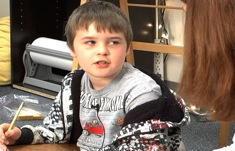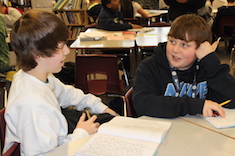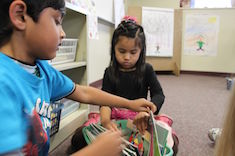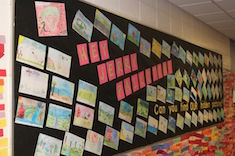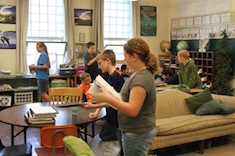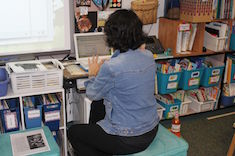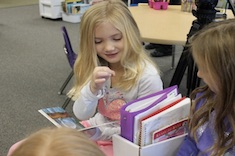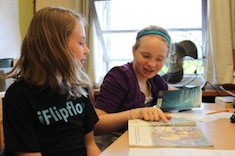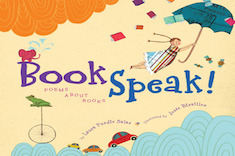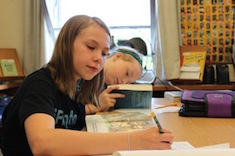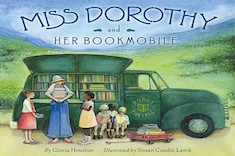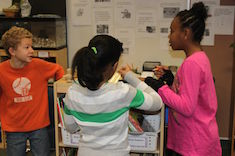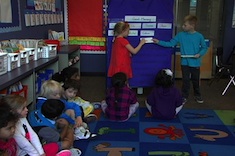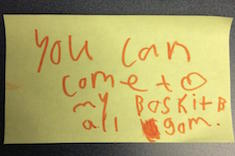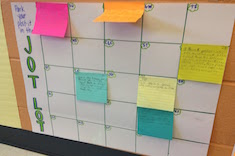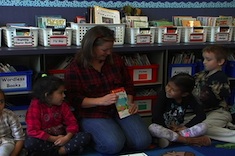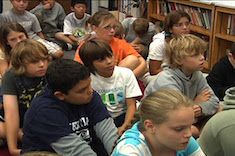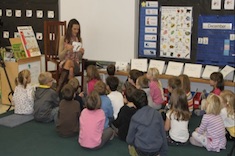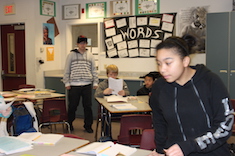Articles
Here is where you’ll find all the latest print features from our contributors. If you’d like to browse specifically by grade level, topic, or contributor, you can use the links in the right sidebar.
Latest Content
Mentor Texts and Important Reminders
Melanie Meehan shares four important tips for using mentor texts effectively with students of any age.
Using If I Stay to Model Literary Analysis
Christy Rush-Levine uses the mentor text If I Stay to model literary analysis, building on her middle school students’ interest in the recent movie.
Building Relationships with Authors
Katie DiCesare is helping her students move from mentor texts to seeing authors as mentors through their websites and other digital resources.
Supporting Student Agency with Questioning Strategies
Katrina Simkins-Moore explains why becoming more intentional in questioning during reading conferences can help build student independence, as well as consistency among the teaching community.
Small Solutions for Big Problems with Classroom Discussions
Gretchen Schroeder shares some conversation fixes for when talk goes awry in her high school classroom.
Reading Ambassadors
Cathy Mere finds that a Reading Ambassadors program pays big dividends in building confident and conversant young readers.
Hosting Reading and Writing Events
Gigi McAllister explains why you have to be a bit choosy about reading and writing events since there are so many possibilities. Here are some she values in her fourth-grade classroom.
The Ocean Research Project: From Launch to Celebration in 10 Days
Ten days from the launch of student research projects to a celebration with families? Katherine Sokolowski shares how a tight time frame that concludes with an evening event can bring energy and high student interest to the research process.
Building Excitement for Book Awards
Bitsy Parks finds building excitement for book awards works in tandem with generating enthusiasm for reading in her first-grade classroom.
Teachers Who Write
Melanie Meehan explains why your own writing, however imperfect it is, might enhance your teaching tremendously.
The Riskiest Writing
Mary Lee Hahn tackles the riskiest writing of all — in front of students and improvised with no advance drafting or planning.
Get in the Pool: Teachers Who Write
Ruth Ayres shares how she was always someone who wrote—until she became a teacher. Getting back into writing was all about motivating her reluctant students.
The Power of Picture Book Conversations
Katie DiCesare uses conversations around picture books to build communication, community, and reading skills in her first-grade classroom. Late in the school year she reflects with students about why these conversations are so powerful.
Research Through Picture Books
Katherine Sokolowski explains how picture books can be a potent tool for teaching intermediate students research skills.
News from the Interior
Shirl McPhillips shares a new poem, as well as some practical tips on moving from random observations to vivid details to poetry.
Easing into Writing Poetry
Tara Smith describes how she eases her sixth-grade students into writing poetry through careful selection and analysis of mentor poems.
Beyond the Acrostic Poem
Megan Skogstad finds the right mentor texts can help her fourth graders move beyond acrostic poems.
Supporting Introverts at Any Age
What many school leaders, teachers, and students have in common is that they are introverts. Matt Renwick remembers exhaustion from his first year of teaching because of introversion, and offers suggestions for meeting the needs of introverts in any school community.
Supporting Introverts in Fifth Grade
Katherine Sokolowski was that shy child hiding behind a tall classmate in the back of the room when she was a student. As a teacher, she makes sure there are many ways she helps bring out the voices of introverts in her fifth-grade classroom.
A Booklist for Women’s History Month
In honor of National Women’s History Month, Sarah Klim presents a booklist that features biographies of some of the lesser-known women who quietly made history, as well as little-known details from the lives of well-known historical figures.
Teaching Students to Start at the Right Place
Melanie Meehan uses focus questions for teaching students to start at the right place in their writing, moving them beyond the bed-to-bed stories that plague so many literacy workshops.
Literacy Routines for Applying See-Think-Wonder
Shari Frost finds that the See-Think-Wonder activity is great to use as a “bell-ringer,” as well as throughout the day to promote deeper thinking and engagement.
Starting the Day with Literacy
Bitsy Parks shares how she starts the day with literacy in her first-grade classroom.
Do I Really Have to Keep Conferring Notes?
Ruth Ayres answers a question from teachers, Do I really have to keep conferring notes? Spoiler alert: The answer is yes.
Reminder Notes
Bitsy Parks teaches her first graders to write sticky note reminders throughout the day, and is delighted by the learning and community building that ensues.
The Ins and Outs of Using a Jot Lot
Tara Barnett and Kate Mills use a jot lot to turn students’ notes on their learning into instructional plans and assessment.
Increasing Read Alouds in the Primary Grades
Bitsy Parks describes her process over the years in increasing both the quality and quantity of read alouds in her first-grade classroom.
Read-Aloud Gone Awry
Jennifer Schwanke shares her experience of having read-aloud go awry in a middle school classroom.
Poetry Read-Alouds During Transitions
Mandy Robek finds that quick poetry read-alouds are a great way to transition between activities in her second-grade classroom and build a love of poems.
Student-Generated Vocabulary Discussions
Tara Barnett and Kate Mills find the key to middle school students attending to new vocabulary during read-alouds is to have students choose the words.
Browse Content By
Type
Category
- Assessment Tools
- Big Fresh Archives
- Booklists
- Choice Numeracy
- Classroom Design
- Common Core
- Community Building
- Conferring
- Content Literacy
- Digital Literacy
- English Language Learners
- Equity
- Family Relations
- Free Samples
- Guiding Groups
- Leadership
- Literacy Coaches
- Mentor Texts
- Minilessons
- New Teacher Mentors
- Podcasts
- Poetry
- Quote Collections
- Reading Strategies
- Self Care
- Struggling and Striving Learners
- Talking and Listening
- Teacher Study Groups
- Teaching Reading
- Teaching Writing
- Word Study and Vocabulary
Author
- Melissa Quimby
- Nawal Qarooni
- Gwen Blumberg
- Julie Cox
- The Lead Learners
- Hannah Tills
- Josie Stewart
- Ruth Metcalfe
- Mallory Messenger
- Becca Burk
- Jodie Bailey
- Vivian Chen
- Mary Brower
- Tiffany Abbott Fuller
- Stephanie Affinito
- Ruth Ayres
- Leigh Anne Eck
- Heather Fisher
- Shari Frost
- Julie Johnson
- Suzy Kaback
- Gigi McAllister
- Shirl McPhillips
- Melanie Meehan
- Cathy Mere
- Debbie Miller
- Tara Barnett and Kate Mills
- Tammy Mulligan
- Dana Murphy
- Bitsy Parks
- David Pittman
- Brenda Power
- Heather Rader
- Matt Renwick
- Mandy Robek
- Christy Rush-Levine
- Gretchen Schroeder
- Jen Schwanke
- Brian Sepe
- Katherine Sokolowski
- Stella Villalba
- Jennifer Vincent
Grade Level
Choice Literacy Membership
Articles
Get full access to all Choice Literacy article content
Videos
Get full access to all Choice Literacy video content
Courses
Access Choice Literacy course curriculum and training




